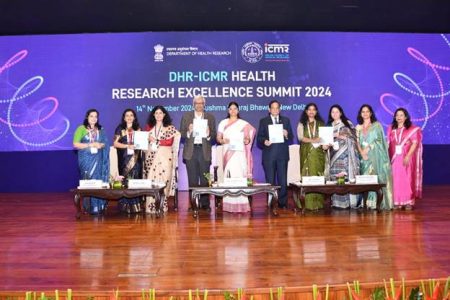New Delhi: The Department of Health Research and the Indian Council of Medical Research (DHR-ICMR) hosted the prestigious DHR-ICMR Health Research Excellence Summit 2024 at Sushma Swaraj Bhawan, New Delhi. Celebrating ICMR’s 113th Foundation Day, the event underscored the organization’s commitment to advancing health research in India and honored outstanding contributions in the biomedical field.
Union Minister for Health & Family Welfare, Jagat Prakash Nadda, addressed the gathering via video message, lauding ICMR’s role in tackling critical health challenges, from infectious diseases like tuberculosis, malaria, and COVID-19 to non-communicable diseases, maternal and child health, and nutrition. “ICMR has been at the forefront of biomedical research, and its contributions have significantly shaped India’s healthcare landscape,” he stated. Congratulating the awardees, Nadda emphasized ICMR’s ongoing commitment to research excellence, pledging to continue the tradition of recognizing outstanding achievements annually.
Minister of State for Health & Family Welfare, Anupriya Patel, who inaugurated the summit, praised ICMR as a pioneer in scientific research and innovation. Reflecting on ICMR’s role in advancing Viksit Bharat 2047, she noted, “DHR-ICMR’s leadership in research continues to drive transformative progress in healthcare. Recognizing these contributions today honors the team’s dedication and serves as an inspiration for future generations.”
Dr. V.K. Paul, Member (Health) of NITI Aayog, highlighted India’s growing influence in global health research, attributing the progress to the innovation and collaboration seen across the sector. He congratulated ICMR for its achievements and encouraged continued efforts towards realizing Prime Minister Narendra Modi’s vision of a developed India.
Dr. Rajiv Bahl, Secretary DHR and Director General ICMR, expressed pride in the strides made by India’s research community. “The DHR-ICMR Health Research Excellence Summit reflects our dedication to fostering impactful research that builds a healthier and more prosperous India,” Dr. Bahl said, extending gratitude to researchers for their invaluable contributions.
The event saw the launch of several major initiatives. The I-RISE Policy (Research Infrastructure Sharing Ecosystem) was introduced to expand access to ICMR’s extensive laboratory network, enhancing collaboration and healthcare innovation. Additionally, the I-Drone Initiative—launched by Prime Minister Narendra Modi on Ayurveda Day—was demonstrated by Minister Anupriya Patel through a live virtual sortie to PHC Yadadri Bhavunagari in Telangana, highlighting advancements in healthcare delivery to remote regions.
ICMR also introduced a new History Book chronicling its century-long contributions to India’s healthcare, along with updated Guidelines on Intellectual Property Policy, CSR Funds, and Technology Transfer. These initiatives aim to support a framework for innovation, collaboration, and optimized resource management.
The Summit honored exceptional researchers and institutions with awards across categories, including Best Research Paper, Best Innovation, Best Team Research, and Best Ph.D. Student. Institutional accolades recognized the Best ICMR Institute, Best Extramural Institute, Best Multi-Disciplinary Research Unit, Best Model Rural Health Research Unit, Best Viral Research and Diagnostic Laboratory, and Best Health Technology Assessment Centre.
The DHR-ICMR Health Research Excellence Summit underscored India’s commitment to research-driven healthcare advancements, reaffirming ICMR’s pivotal role in leading the nation towards health resilience and innovation.

